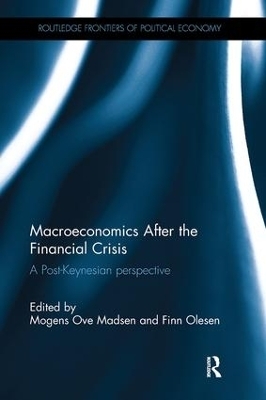
Macroeconomics After the Financial Crisis
Routledge (Verlag)
978-1-138-49550-0 (ISBN)
Since the outbreak of the current international economic crisis in 2008, the USA and many of the European countries have been tormented by high levels of unemployment and low levels of inflation, interest rates close to zero and fiscal policies of austerity. As such, the modern economic mainstream has been challenged by these empirical facts. Today, several years after the outbreak of the international economic crisis, supply side effects do not seem to be increasing employment as the modern mainstream claimed they would. Aggregate demand has to play a more important role in macroeconomic analysis than hitherto. That is, there is a need for alternative explanations of how a modern macro economy is expected to function and how the macroeconomic outcome could be manipulated by the right economic policy proposals. As expressed by the contents of the present book, a Post Keynesian understanding proposes such an alternative theoretically, methodologically and in terms of policy measures.
This book will present new materials and approaches, especially new evidence and new views on the potential problems of public debt, the European Union and the present crisis, Central Banking, hysteresis in an agent based framework, the foundations of macroeconomics and the problems of uncertainty.
Mogens Ove Madsen is Associate Professor at the Department of Business and Management, Aalborg University, Denmark Finn Olesen is Professor at the Department of Business and Management, Aalborg University, Denmark
1. The Great Recession – an introductory view Mogens Ove Madsen & Finn Olesen 2. Keynes "in the 21st Century" – Tradition, circumstance, fad and pretense in the wake of the Great Crisis James Galbraith 3. Public debt, secular stagnation and functional finance Peter Skott 4. Neoliberal economic policy, growth models and the crisis in the Euro area Engelbert Stockhammer 5. Corporatism and Capital Accumulation: The Fate of the Nordic Model Jonathan Perraton 6. Structural budget deficits: Getting causality right Jesper Jespersen 7. The Making of a Revolution – How important are economic crises? Finn Olesen 8. The need for macro foundations for microeconomic theory Claude Gnos 9. Microfoundations – on the use and misuse of theories and models in economics Lars Pålsson Syll 10. Böhm-Bawerk meets Keynes – what does determine the interest rate, and can it become negative? Ulrich van Suntum & Tom Neugebauer 11. The Socio-Economic Philosophy of Keynes: Lessons for the 21st Century Eric Berr 12. Towards a Theoretical Foundation of Animal Spirits: Probability, Uncertainty and Intentionality Joachim Güntzel 13. Two Generations of Path Dependence in Economics? Mogens Ove Madsen
| Erscheinungsdatum | 07.01.2018 |
|---|---|
| Reihe/Serie | Routledge Frontiers of Political Economy |
| Zusatzinfo | 5 Tables, black and white; 27 Line drawings, black and white |
| Verlagsort | London |
| Sprache | englisch |
| Maße | 156 x 234 mm |
| Gewicht | 317 g |
| Themenwelt | Sozialwissenschaften ► Politik / Verwaltung ► Europäische / Internationale Politik |
| Sozialwissenschaften ► Politik / Verwaltung ► Vergleichende Politikwissenschaften | |
| Wirtschaft ► Allgemeines / Lexika | |
| Wirtschaft ► Volkswirtschaftslehre ► Finanzwissenschaft | |
| Wirtschaft ► Volkswirtschaftslehre ► Makroökonomie | |
| Wirtschaft ► Volkswirtschaftslehre ► Wirtschaftspolitik | |
| ISBN-10 | 1-138-49550-6 / 1138495506 |
| ISBN-13 | 978-1-138-49550-0 / 9781138495500 |
| Zustand | Neuware |
| Informationen gemäß Produktsicherheitsverordnung (GPSR) | |
| Haben Sie eine Frage zum Produkt? |
aus dem Bereich


